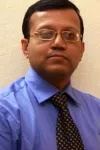The George Institute brings together experts to address adolescent mental health challenges in India
New Delhi, 21st February 2025: The George Institute for Global Health India hosted "Addressing Adolescent Mental Health Using Life Skills Education: ANUMATI - An intervention in urban slums In India a policy symposium, to address adolescent mental health in the country on 20th February 2025. The project aims to enhance the resilience and mental health of teenagers living in urban slums through life skills development, and to reduce stigma related to mental health amongst them by fostering healthy discussions around mental health amongst them.
Adolescence is a crucial period of rapid physical, psychological, and social changes that can lead to significant stress. Various studies suggest that stress among adolescents is on the rise, posing a threat to their mental well-being. This stress can also have an impact on an adolescent's psychological well-being influenced by inherent biological factors, such as brain development and hormonal changes, and behavioral factors, including coping skills and resilience, all of which are affected by larger family and community level factors.
Adolescents, especially older ones (aged 15 to19 years) experience numerous transitions such as increasing responsibility in decision-making, especially related to academics, personal stressors including those related to interpersonal relationships with peers, families and other community members and other environmental stressors that affect them in their daily lives. According to the 2022 NCERT Survey, approximately 80% of students in classes 9-12 experienced anxiety due to exams and academic pressures. The symposium focused on equipping adolescents with essential life skills to enhance their resilience against such stressors.
Key Data on Adolescent Health and Behavior
Adolescents form 25% of India's population, with 20% of the world’s adolescents residing in India. However, many face behavioral and health challenges, including:
- General anxiety: 27%
- Academic stress: 58%
- Risky behaviors: 77.5%
- Cannabis use: 11%
- Alcohol consumption: 18%
- Inadequate physical activity: 74%
- Limited maternal knowledge on diet and exercise: 65%
- Overweight/obesity: 19.2% of boys, 18.1% of girls
These figures highlight the urgent need for comprehensive intervention programs to improve adolescent mental and physical health. The George Institute’s ANUMATI 2.0 initiative aims to bridge this gap through life skills education, fostering resilience, and reducing mental health stigma in urban slum communities. The ANUMATI 2.0 project also builds on earlier work done by the institute to address stigma related to mental health among adolescents as part of the ARTEMIS project conducted in Delhi and Vijayawada. It encourages discussion about mental health related issues amongst adolescents through in-person and online platforms and foster positive mental health.
Highlighting the significance of adolescent mental health and the role of ANUMATI 2.0., Prof. Pallab Maulik, Director of Research at The George Institute for Global Health India, said:
Addressing mental health needs and reducing stigma related to mental health is important among adolescents. India is home to more than 250 million adolescents and for the better health of the nation it is imperative that we take all steps necessary to improve the psychological wellbeing of these future adults who would lead the country in the next decades. Through projects like ANUMATI we will help to reduce the burden of mental illness and support the government efforts.
By:Prof. Pallab Maulik
Director of Research at The George Institute for Global Health India
While speaking about the importance of addressing depression and mental health issues among adolescents, Ms. Jyothi Ravichandran, Mental Health Specialist, UNICEF India, said:
Every $1 invested in prevention saves $5 in healthcare costs, reducing the financial burden on individuals and the system. By engaging adolescents in schools, communities, and homes, we can create accessible support networks to ensure healthier futures for all.
By:Ms. Jyothi Ravichandran
Mental Health Specialist, UNICEF India
The symposium featured two insightful panel discussions. The first, "Voices from the Ground," provided a platform for community perspectives, featuring Ms. Muskan, a member of the ANUMATI 2.0 Adolescent Expert Advisory Group; parent representatives; and Head of School from a government school in Sultanpuri as a school representative. This session highlighted key challenges faced by adolescents, including growing distance from parents, peer pressure, academic stress, drug addiction and the fear of failure. Parents expressed concerns about adolescent spending more time on their phones rather than sharing their thoughts and engaging with family.
The significance of fostering strong connections between children, parents, and teachers was highlighted during the discussion. Panelists concurred that when schools take responsibility and create a supportive environment, adolescents are more likely to thrive and reach their full potential
The second panel, "Experts Speak," brought together leading professionals, including Dr. Yutaro Setoya, Team Lead – NCD and co-morbidities from WHO India, Prof. Rajesh Sagar, Professor of Psychiatry from AIIMS New Delhi, Ms. Pavani, Programme Director from Rubaroo - Hyderabad, and Prof. Pallab Maulik, Director of Research from The George Institute India. The discussion explored key stressors impacting adolescents, the rising burden of academic pressures, and the role of health systems in addressing mental well-being. Experts also highlighted the healthy use of technology and social media, emphasizing their potential in providing mental health support while mitigating risks. A strong takeaway from the session—prioritizing mental health in policies, strengthening support systems, addressing stigma and fostering digital well-being are crucial to empowering adolescents for a healthier future.
Talking about the ANUMATI 2.0 project, Dr. Y.K. Sandhya, Program Lead – Mental Health at The George Institute for Global Health, India, said:
Active and direct engagement of research participants can result in studies that are meaningful and relevant to the community. In studies that are focused on adolescents for instance, setting up systems that enable seeking their inputs on a sustained basis is critical for the success of the study/programme. Parental engagement and buy in are also critical for research that involves adolescents.
By:Dr. Y.K. Sandhya
Program Lead – Mental Health at The George Institute for Global Health, India
The symposium served as a platform for knowledge exchange and collaborative action, fostering impactful policies to improve adolescent mental health outcomes in India.
Stay connected and updated
Subscribe to our mailing list for the latest news, events, and updates in health research.


